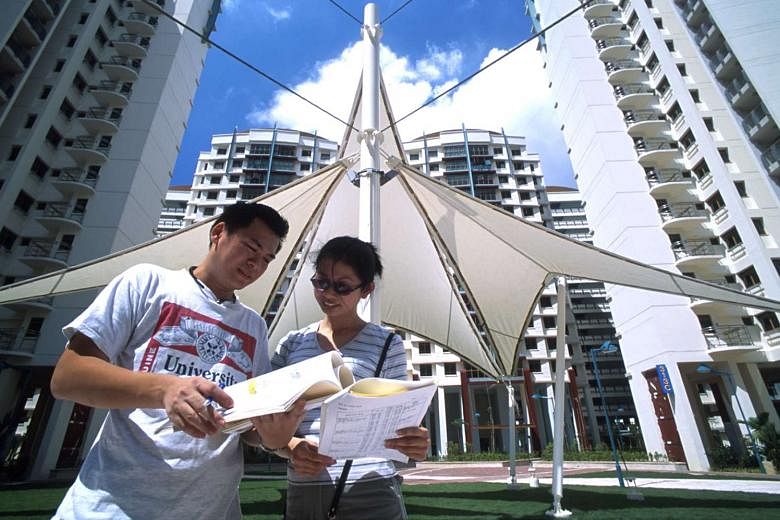Home loans: Refinance, reprice or prepay?
Ten days ago, Singaporeans woke to the news that the United States Federal Reserve had hiked US interest rates for the first time in nearly a decade, on growing optimism over the recovering US economy.
For years, the Fed had held its benchmark lending rate near zero to battle the global financial crisis and to try to nurse the ailing American economy back to health.
From here on, interest rates could continue to climb, albeit gradually, in tandem with economic growth. US rates tend to have a significant impact on rates around the globe.
The Fed's announcement about lifting rates to between 0.25 per cent and 0.5 per cent was widely expected. It was not a question of if, but when, and as the December meeting drew closer, it looked nearly certain. Now that it has finally happened, the focus has shifted to just how the rate hike will affect mortgage rates and home financing here.
Singapore-based lifestyle and personal finance website GET.com saw a nearly fivefold increase in home loan enquiries since the Fed's announcement earlier this month.
Ms Grace Cheng, co-founder and editor-in-chief at GET.com, said the two key interest rates here - Sibor and SOR - are expected to rise correspondingly with the Fed's moves in the near and medium term.
"Homeowners would naturally be more anxious to scour the market to lock in home loan packages with lower interest rates to minimise their interest payments, before rates rise further," Ms Cheng added.
The majority of housing loans offered by banks in Singapore are floating-rate packages. And some 65 per cent of housing loan packages were pegged to Sibor/SOR as at the third quarter of this year, according to the Financial Stability Review released by the Monetary Authority of Singapore last month.
The report added that another 20 per cent of home loan packages were pegged to bank board rates, with the remaining 15 per cent largely packages with mortgage rates fixed for the first few years of the loan.
The Sunday Times highlights what homeowners can do with their loans.
WHAT IS SIBOR AND SOR?

The Sibor or Singapore Interbank Offered Rate is a reference rate that reflects how much it costs banks to borrow from each other.
The SOR or the Swap Offer Rate represents the synthetic cost of borrowing Singapore dollars, by borrowing US dollars for the same maturity and swopping these in return for Sing dollars.
Most banks here offer Sibor-based home loan packages, and they are often pegged to the three-month Sibor.
The three-month Sibor has been creeping up, even before the Fed made its move. It was 1.13375 per cent last Thursday, although this was still way below its peak of 3.56214 per cent in July 2006.
OCBC Bank projects that the three-month Sibor could climb to 1.45 per cent in the first quarter of next year, and increase by 0.2 percentage point in each of the second and third quarter (to 1.65 per cent and 1.85 per cent respectively), before hitting 2.03 per cent in the last quarter of next year. For 2017, the three-month Sibor could come in at 2.53 per cent, OCBC added.

In an illustration, GET.com said the monthly mortgage instalment will rise by $61 within the first three years of a loan if the three-month Sibor went up by 0.25 per cent. This is based on a three-month Sibor of 1.12028 per cent on Dec 9, and a loan of $500,000 over 25 years.

The three-month SOR rate has been similarly on the upward trend, at 1.63773 per cent last Wednesday, compared with 1.59558 per cent last Tuesday.
OCBC expects the three-month SOR rate to hit 1.75 per cent in the first quarter next year, and then rise by 0.1 percentage point for each successive quarter that year (1.85 per cent, 1.95 per cent, 2.05 per cent). The three-month SOR rate could climb to 2.55 per cent in 2017.
REFINANCE, REPRICE OR PREPAY?
With interest-rate trends pointing north, borrowers may be thinking about refinancing, repricing or even prepaying a loan. But home-loan experts urge borrowers to proceed with caution.
"Homeowners should be aware of their financial circumstance and mortgage conditions...It would make sense to change one's mortgage only if the potential interest savings are higher than the costs involved," Ms Cheng said. Factors that homeowners should consider include:
•Lock-in period, or the time frame in which the borrower has to keep the mortgage with the bank;
•Prepayment penalties, which could be between 0.75 and 2 per cent of the loan amount prepaid;
•Cancellation fees, usually between 0.5 per cent and 2 per cent of the loan amount cancelled;
•Legal fees and valuation fees; and
•The "clawback" of subsidies given by the current lender.
Home-grown personal finance portal, MoneySmart.sg, told The Sunday Times that homeowners should also look at how the loan packages are structured, as some may offer savings in the first year or so, but then climb to interest rates much higher than owners' present rates in subsequent years.
In making partial repayment, borrowers also need to be mindful of their financial needs.
Mr Alfred Chia, chief executive officer of SingCapital, said: "We should have a regular review of our debt and do partial repayment as the situation permits. However, there are other financial plans to consider, such as retirement planning and children's education funding."
GET.com added that there is no need to pay off a loan in a hurry, and that the adage "cash is king" holds true.
"Even with an impending rise in Sibor/SOR rates, the increase is unlikely to be anything sudden and sharp... Borrowers would be better off maintaining liquidity on hand for viable investments," Ms Cheng explained.
HOME-LOAN PACKAGES
To safeguard against rising interest rates, GET.com recommends packages pegged to longer-term fixed rates for three to five years, or short-term fixed rates for two to three years, followed by rates pegged to fixed deposit rates and banks' board rate without a penalty period.
Two of the five most popular home-loan packages in the fourth quarter of this year are deposit-based home loans, MoneySmart.sg added. These are offered by DBS Bank and OCBC Bank.
On the other hand, borrowers who do not think that rates will accelerate quickly or prefer a lower starting interest rate can still opt for a Sibor-pegged package.
Few home loans are pegged to SOR, but Mr Chia of SingCapital said homeowners who have such loans should switch out of it to fixed-rate or fixed deposit-based home loans.
SOR rates are more volatile than Sibor, because they are influenced by foreign exchange rates. That said, Sibor and SOR, while affected by different factors, still tend to trend in the same general direction.
POSSIBLE OPTIONS
NEW BORROWERS: For those who have taken out a home loan within the last year or so, for example, MoneySmart.sg founder and chief executive Vinod Nair said: "Their hands may be tied."
That is because these borrowers will likely still be within a lock-in period with the existing lender, and will face a penalty charge if they opt to repay their loan, or refinance their loan by switching to a package from another bank. Even if there is no lock-in period, the borrower will incur costly legal fees to switch to another lender.
Experts say these borrowers, within the lock-in period, should maintain their loan or, when available, reprice to a more favourable loan package with the same bank. Repricing is generally cheaper than refinancing, as it does not entail costly legal fees.
'MID-WAY' BORROWERS: Borrowers who are midway through servicing their home loan and still have a sizeable sum of the loan quantum - between $500,000 and $1 million - to pay down may wish to consider refinancing.
Mr Nair said: "Those on board rates determined by banks and paying interest rates above 2.5 per cent, or on Sibor- or SOR-pegged packages with bank spreads above the 1.25 per cent mark, should strongly consider refinancing."
For many borrowers, interest is calculated as Sibor/SOR rate plus a spread, which is a margin imposed by the bank on top of the Sibor/SOR rate. MoneySmart.sg said homeowners who are on Sibor-pegged packages with "very low thereafter bank spreads, or bank spreads which are fixed in the thereafter from the fourth year" can consider staying put for now.
BORROWERS AT TAIL-END OF LOAN TENURE: Homeowners with several years left on their loan tenure may wish to prepay in full, or refinance or reprice to a cheaper loan package. But Mr Nair said it may not be worthwhile to refinance the loan if the outstanding amount is below $200,000, given the cost of doing so.
"Legal subsidies offered by banks will usually be given should the loan quantum be above a certain level, in most cases $500,000 and above. The cost of legal fees will probably negate any savings you make from a lower or safer mortgage loan package," he added.
WHAT TO WATCH OUT FOR
With the increase in interest rates, which pushes up borrowing costs and loan repayments, GET.com said investors should also keep an eye out for declining rental yield.
An elevated interest-rate environment may also deter prospective buyers from purchasing property, which could lead to softer real estate prices.
SingCapital's Mr Chia pointed out that the borrower's job stability is a key factor, as a "negative change will impair his repayment capability".






